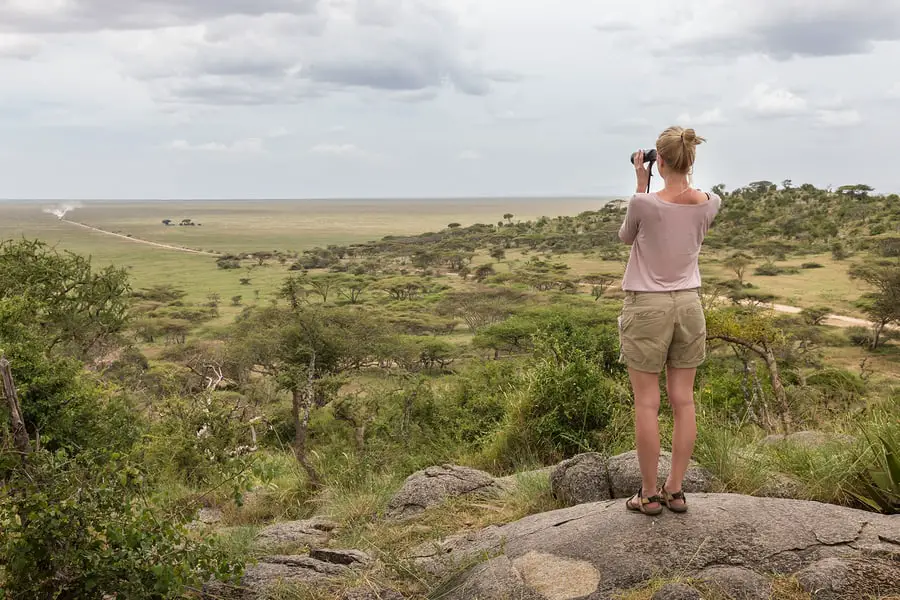Table of Contents
*This post may contain affiliate links. As an Amazon Associate we earn from qualifying purchases.
Are you wondering how you’re going to see all the animals up close when you’re out on a game drive?
This is where safari binoculars come in.
There’s so much to see when you’re on a safari, and most of the animals you’ll see are too dangerous to be seen up close, hence the need for a good pair of binoculars.
You need to make sure that you don’t miss the action even it happens far away. Safari vehicles can’t take you from one place to the other in the blink of an eye. If you can’t get closer to the action, safari binoculars can bring the action closer to you.
So how do you go about buying binoculars for a safari especially if you can’t afford to get high-priced options?
1. Know Your Average Budget
Purchasing a good pair of safari binoculars doesn’t come cheap. However, thanks to some incredible manufacturers and online stores, the prices of binoculars have reduced over the past few years.
Even though prices are falling, we suggest you look for something between $200 and $300 to get what you really want during a safari tour.
If your budget doesn’t allow a $200-$300-range then the best option is to save your money and buy at special times of the year such as on Black Friday.
Keep an eye open for promotions that gadget stores might have throughout the year. Stay away from binoculars that cost $100 and less. Some of the better brands to consider are Nikon Monarch and Pentax Papilio. They are among the better low-price options.
2. Know What’s Best for You
Searching for the best binoculars for a safari doesn’t seem easy when the budget is tight. With a low budget, you need to redefine the term best in an attempt to create a balance between what you pay and what you want.
3. Opt for Binoculars that Give Good Image Quality
Knowing how to choose safari binoculars can seem pretty simple but the best way to do it is to select the ones that feature better image quality at a set price range. It isn’t necessary to opt for the highest quality – just good image quality is good enough.
We also think that safari binoculars don’t require high magnification. When in a safari vehicle, you don’t always need to zoom in a lot. Moreover, the higher magnification means that field of view will narrow down. The best magnification range is from 8x to 10x.
4. Suitable Lens for Safari Binoculars
The most suitable lens for safari binoculars are generally in the 32mm to 42mm range. Why is this so? The reason is because these lenses are capable of better imaging when the light is low. To make sure that you don’t miss the action during dawn and the dusk, you must avoid using a smaller lens.
On the other hand, lightweight binoculars for safari are easy to carry around and very portable. So in the end, if you prefer to carry something light, choose a lens closer to 32 mm, it’ll be less heavy.
5. Visit Local Shops and Compare Prices
When buying safari binoculars before you settle on the pair you want to buy, you should visit local shops and see the prices.
Compare prices with online retailers such as eBay and Amazon before buying too. If you’re not finicky, you can even purchase a second-hand pair of binoculars that’s in good condition.
You can also find out if there are any shops that allow people to rent out binoculars instead of buying them.
Don’t forget that safari nights are full of activity and that lodges may sometimes organize evening game drives where having night vision binoculars will be a great advantage to you. Some of the best places to check and compare binocular prices, images, and specs are Amazon and eBay.
Binoculars Aren’t a Necessity but a Welcome Accessory
Many will argue that binoculars are not a necessity. This is true. They are more of an accessory if anything. However, if you’re flying all the way out to a safari in Africa, you might as well make it as memorable as you can.
Seeing the animals up close in detail is nice. If you’re keen on taking good photos, having binoculars on hand to scan the plains before focusing a shot is important.
Binoculars may not be a necessity, but they are definitely a welcome accessory on your tour through Africa.

